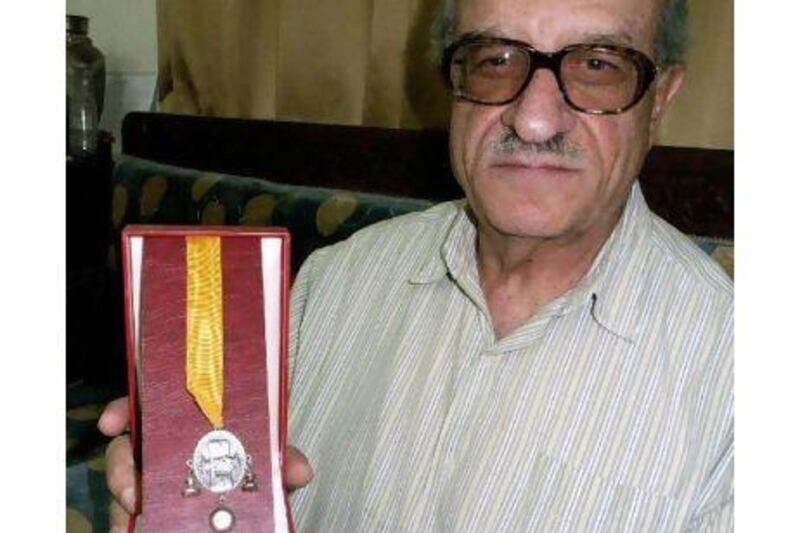DAMASCUS // A leading human rights activist aged 80 is expected to be freed from jail as part of an amnesty for thousands of prisoners announced by Syrian president Bashar al Assad yesterday.
Lawyers associated with Haitham al Maleh's case said they had been told he would qualify for a pardon because of his age. The presidential decree applies to prisoners convicted of minor offences, those deemed to be in frail health, or those older than 70.
A former judge and lawyer who has received international recognition for his defence of human rights, Mr al Maleh celebrated his 80th birthday behind bars a few months ago.
He was sentenced to three years in prison last July under emergency laws for "weakening national morale", a punishment that would have seen him detained until October 2012. Mr al Maleh had previously spent six years as a political prisoner in the 1980s.
In 2006 he was awarded the Dutch Geuzen Medal, a human rights prize named after resistance fighters who fought against the Nazis.
"If he is released, and we believe that is what will happen, we welcome that," said Ammar Qurabi, head of the National Organisation for Human Rights in Syria (NOHRS). "From the beginning, the arrest of Haitham al Maleh was wrong so this release would go some way to undoing that mistake."
Mr al Maleh will remain in jail until his defence team completes some legal formalities. It remains unclear how long that will take, but Syrian legal experts said they expected him to leave Adra prison in Damascus "soon".
His release had not been expected and yesterday morning, before the general pardon was announced, human rights activists said a group of prisoners in Adra, including Mr al Maleh, had decided to go on hunger strike to protest continued political arrests.
Civil rights campaigners in Syria said the amnesty for prisoners, including Mr al Maleh, did not signal the easing of a crackdown on opposition groups and human rights activists.
Abdul Karim Rehawe, head of the Syrian League for the Defence of Human Rights, and part of a coalition of activists that also includes NOHRS, said: "Haitham al Maleh is the only political prisoner to be freed under the amnesty, the rest remain in prison."
That coalition yesterday repeated its calls for amnesty for all political prisoners, saying authorities should "close the file" and respect international laws.
The detainees in Adra now on hunger strike include Anwar Bunni, Habib Saleh, Mustafa Jomaa, Ali Abdullah, Mahmud Barish, Kamal Labouani, Mohamed Sayed Omar, Mashal Tamo, Khalaf Jarbou, Saadun Sheikho, Ismail Abdi and Kamal Sheiko.
Sheiko, a 32-year-old blogger, has been refusing food since February 16. He appeared in court yesterday but, according to Syrian human rights groups, he was in poor health and refused to answer questions put to him by the judge. The hearing was postponed for a week.
Both the amnesty of prisoners, and the announcement of the hunger strikes were timed to coincide with today's anniversary of the Baath Party's taking power 48 years ago, an occasion marked by a national holiday in Syria. Mr Assad has ordered similar prisoner amnesties in the past, releasing thousands of inmates.
Rather than a cause for festivities, civil rights campaigners say the anniversary of the Baathist revolution marks almost half a decade in which Syrians have lived under draconian emergency laws, renewed by the Baathists after the coup that saw them take control of the country.
In a joint statement issued by the Syrian Observatory of Human Rights yesterday, the hunger strikers demanded a lifting of the state of emergency.
The "Syrian people suffer tremendously under a despotic and corrupt authority," the statement said. "We have also paid dearly for the cause of law and freedom, but it is time to cancel this state of oppression and persecution at a time the winds of change are sweeping the Arab world.
"Rights cannot be legitimate in Egypt and Tunisia but illegitimate in Syria."
The Syrian authorities justify retaining emergency laws, giving them wide powers of arrest and detention, on the grounds that the country remains at war with Israel.
Critics of the law say it is illegal under the constitution and is not applied to enemies of the country, but rather to those calling for peaceful democratic reforms.
Many political activists and human rights campaigners, such as Mr al Maleh, have been jailed under the umbrella of the state of emergency.
Last month, a special security court, convened under the emergency laws, sentenced a teenage blogger, Tal al Molouhi, to five years in jail on charges of revealing information to a foreign country.
The Syrian government took the unusual step of commenting publicly on the case, saying Ms al Molouhi had been spying for Washington.





